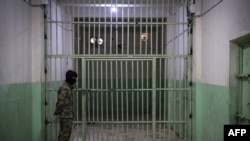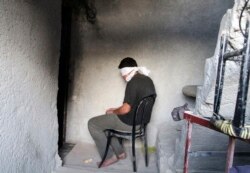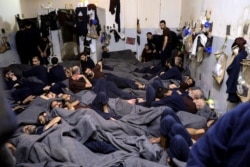The rapid spread of the coronavirus has raised concerns among United Nations officials and rights groups about the fate of political prisoners in war-ravaged Syria.
U.N. officials believe Syria is one of the countries where the potential spread of the deadly virus in prisons is extremely high.
"We urge the Syrian government and the armed groups to take urgent action, following the example of other countries to release sufficient numbers of detainees to prevent COVID-19 leading to yet more loss of life and misery after nine years of unrelenting death, destruction to the health system and displacement," Rupert Colville, spokesperson for the U.N. Higher Commissioner for Human Rights, said in statement last week.
Since the eruption of the civil war in Syria in 2011, thousands of people have been detained or have forcibly disappeared and have been subjected to torture and other ill-treatment, rights groups say.
According to U.N. data in 2019, an estimated 100,000 people are currently detained, abducted or missing in Syria.
Most of those detainees are held in government prisons, rights groups say.
London-based Amnesty International urged Syrian authorities to cooperate with U.N. agencies and humanitarian organizations to prevent the spread of COVID-19 in the country, particularly in prisons, detention centers and military hospitals.
"We are calling for the release of all prisoners of conscience from Syrian jails before COVID-19 ravages the prison population, where detainees are already tortured, malnourished and living in very overcrowded conditions," Philippe Nassif, Middle East and North Africa advocacy director at Amnesty International, told VOA.
Amnesty International added that Syrian prisoners and detainees are at risk of contracting the disease, since they are held in unhygienic conditions in locations across the country.
Responses
While experts like Joshua Landis, director of the Center for Middle East Studies at the University of Oklahoma, believe "it seems unlikely that (prisoners) will be released because of the fear of coronavirus," some nonstate armed groups in the country have responded to U.N. calls.
The Syrian Democratic Forces (SDF), a U.S.-backed military alliance that controls nearly one-third of Syria's territory, last week announced the formation of a committee to investigate cases of political prisoners.
"We will reach out to all parties involved in this matter," said Ilham Ahmad, co-chair of the Syrian Democratic Council, the political wing of SDF.
"We are seeking to put so much effort until we have a Syria without prisoners of conscience," she told VOA, adding that, "having political prisoners doesn't lead to reconciliation and peace, but releasing them would lead to a solution."
In addition to nearly 10,000 Islamic State (IS) militants captured after the military defeat of the terror group in March 2019, rights groups believe the SDF holds dozens of dissidents and political opponents.
But Ahmad said "the autonomous administration (in northeast Syria) has released prisoners in the past. Through local dialogue initiatives, we have even released some individuals affiliated with IS, those who were not involved in committing war crimes."
Rights groups say they have also documented hundreds of cases of people detained arbitrarily in northwest Syria, including Idlib and Afrin, where Turkish-backed rebels and extremist groups continue to carry out abuses against the local population.
Rebel groups have not yet responded to U.N. calls to release prisoners in their custody.
U.N. follow-up
Rights experts say that given the complex nature of political prisoners in Syria, the U.N. should be more involved in investigating their cases.
"Most warring parties in Syria, including the regime, opposition and SDF, deny detaining people for their political views," said Bassam al-Ahmad, co-founder and executive director of Syrians for Truth and Justice, an advocacy group that documents human rights abuses in Syria.
"From their perspective, those detained are criminals. But according to international law, most of those people have been jailed arbitrarily without any regard for human rights conventions," he told VOA.
Al-Ahmad added that the "U.N. initiative would be practical only if international observers and rights organizations could diligently follow up with cases of political prisoners detained throughout Syria."
Presidential decree
In late March, Syrian President Bashar al-Assad issued a decree granting amnesty for some crimes and for military defectors, without mentioning political prisoners.
U.N. officials believe the move could be the cornerstone for a "large-scale release of detainees and abductees" in Syria.
"I am engaging the Syrian government specifically on this matter, including in light of President Assad's 22 March decree outlining amnesties and sentence reductions for certain types of detainees, as well as specific exemptions," Geir Pedersen, U.N. special envoy for Syria, said in a recent briefing at the Security Council.
As of Monday, Syrian authorities say there have been 19 confirmed cases of the coronavirus, including two deaths. But heath experts believe the number of suspected COVID-19 patients in Syria could be much higher because the country has limited resources to test people for the virus.






